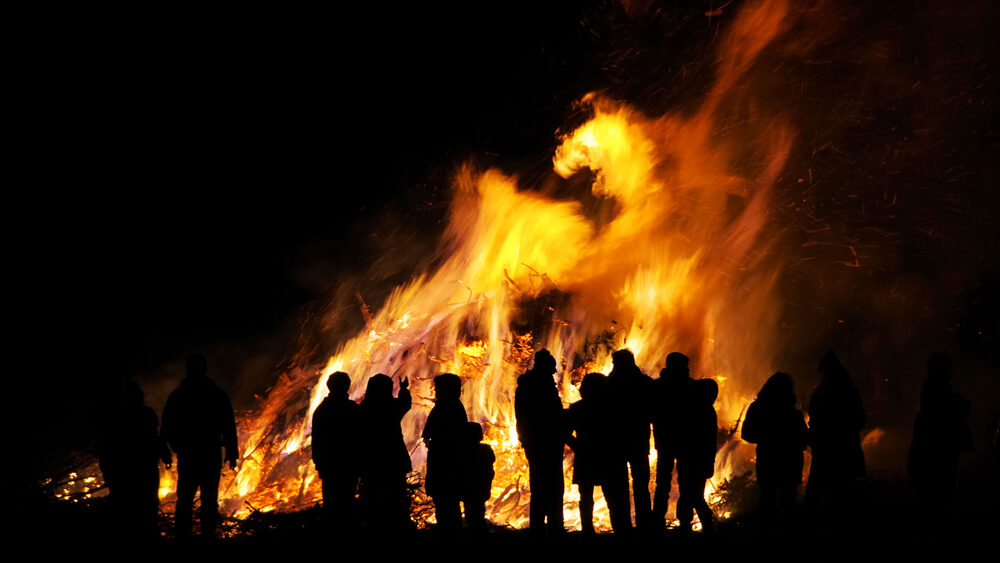Deliberate fire-setting incidents decrease by over one-third in Scotland around Bonfire Night
- October 31, 2023
- 10:52 am


Iain Hoey
Share this content
Drop in deliberate fire-setting
Deliberate fire-setting in Scotland has decreased by over a third leading up to Bonfire Night.
According to Scottish Fire and Rescue Service (SFRS) figures, the number of intentional fires in the three weeks preceding 5 November dropped from 1,302 in 2018 to 907 – marking a 35% reduction.
Regional analysis of fire-setting incidents
The data also highlighted a 40% decrease in deliberate fire-setting in both Glasgow and Edinburgh.
Similarly, East, North, and South Ayrshire witnessed a 53% reduction, whereas the Falkirk and West Lothian areas saw a 25% decline.
Most of these incidents primarily consisted of outdoor fires affecting refuse and woodlands, but hundreds of building and vehicle fires were also reported.
Emphasis on prevention and education
Deputy Assistant Chief Officer (DACO) Iain Macleod, SFRS Head of Prevention and Protection, attributes the decline to continuous prevention efforts including school visits.
He commented: “We do so much more than simply responding to fires and prevention is always a key pillar of our work.”
Every year at this time of year our crews are mobilised to deal with deliberately set bonfires and to help people injured by the careless use of fireworks – particularly children and young people.
“But we always want to prevent fires, accidents or injuries from occurring in the first place.
“In the build-up to the Bonfire Night period, we work tirelessly to engage directly with schools and community groups to educate our young people on the dangers of deliberate fire-setting, bonfires, and fireworks.
“Clearly we welcome any fall in this type of activity as this reduces the risk to the wider community and the impact this type of behaviour can have on our firefighters.”
Scotland’s firefighters and safety teams visit numerous primary and secondary schools each year to provide safety presentations and make students aware of the hazards of bonfires and fireworks.
In the past year alone, SFRS engaged with over 600 schools and reached more than 8,000 young individuals aged between 10 and 14.
The young attendees receive guidance on injury prevention, emergency procedures, and the legalities surrounding fireworks in Scotland.
Safety reminders for the public
DACO Macleod also emphasised the dangers of hosting events at home. Research from the Care of Burns in Scotland (COBIS) indicates that most incidents and injuries during the Bonfire Night period happen at private residences.
He advised: “We want people to enjoy themselves however this must be done safely and responsibly.
“Our message is clear – leave fireworks to the professionals and attend an organised event where possible.
“If anyone is thinking about hosting a private event involving flame or fireworks, please ensure you are aware of the laws around the use of fireworks and always follow the Fireworks Code to keep everyone safe.”
David McGill, Lead Clinician for COBIS and Consultant Plastic Surgeon at Scotland’s Burn Hub, added: “Unfortunately we see a rise in burn injuries around Bonfire Night, in both adults and children.
“We carry out an annual audit of firework injuries across Scotland, and last year there were 41 injuries recorded over the four-week period around Guy Fawkes night.
“The majority of these occurred at private properties. Injuries reported ranged from minor, such as burns to the fingers, to severe including loss of fingers and complex eye injuries with loss of vision.
“Children are frequently burned with sparklers. There’s a misunderstanding of how hot they can get.
“They can cause severe burns to fingers and hands, or catch clothing alight. Sparklers should never be given to children under the age of five.
“Great care should be taken around fireworks, especially when children are near. To minimise the risks to you and your family, a publicly arranged event would be by far the safest way to view fireworks.”
IFSJ Comment
The significant reduction in deliberate fire-setting incidents around Bonfire Night in Scotland demonstrates the impact of continuous prevention and education efforts.
Such positive trends can potentially lead to safer communities and reduce strain on emergency services.
The collaboration between SFRS, COBIS, and schools has proven effective in driving change.
This proactive approach towards safety, especially with the younger generation, is setting a precedent that other regions might benefit from emulating.

